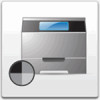Lexmark Monochrome Laser Complete Printer Reference (1.7 MB) - Page 191
LocalTalk port, Infrared port
 |
View all Lexmark Monochrome Laser manuals
Add to My Manuals
Save this manual to your list of manuals |
Page 191 highlights
RS-232C or RS-422A. The serial port on the adapter supports the NPA protocol. NPA Mode can be set to On, Off, or Auto. Note: MarkVision does not support printers attached to the serial port. The serial settings for a tri-port card are held in NVRAM on the printer and not the adapter itself. If you move a card from one ISP to another, the settings remain with the first ISP and are not moved with the card. You can also add a serial port to the printer with a MarkNet Pro 3 external print server or a serial interface adapter. See page 186 for information about the serial interface adapter. See page 189 for information about the MarkNet Pro external print server. LocalTalk port The LocalTalk port on the tri-port card can attach the printer directly to an individual Macintosh computer or to a LocalTalk network. This standard 8-pin LocalTalk port requires a cable with an 8-pin mini-DIN connector. The LocalTalk port fully supports NPAP and works in conjunction with MarkVision for Macintosh (see "MarkVision printer management software" on page 197). If two tri-port cards are installed, the printer only supports one LocalTalk connection. Select the LocalTalk port you want to use from the LocalTalk Port Menu. Infrared port The infrared port is fully compatible with Infrared Data Association (IrDA) Version 1.0. It supports a maximum 1MB per second baud rate with a maximum distance from workstation to adapter of one meter. To use the infrared port, you must have a special infrared adapter. The infrared adapter connects to the infrared port on the tri-port card and is used to send and receive the infrared signals to and from the workstation. If two tri-port cards are installed, the printer only supports one infrared connection. Select the infrared port you want to use from the Infrared Port Menu. Refer to the Optra W810 Setup Guide for more information about connecting an infrared adapter to your printer. Connectivity and network management 191















